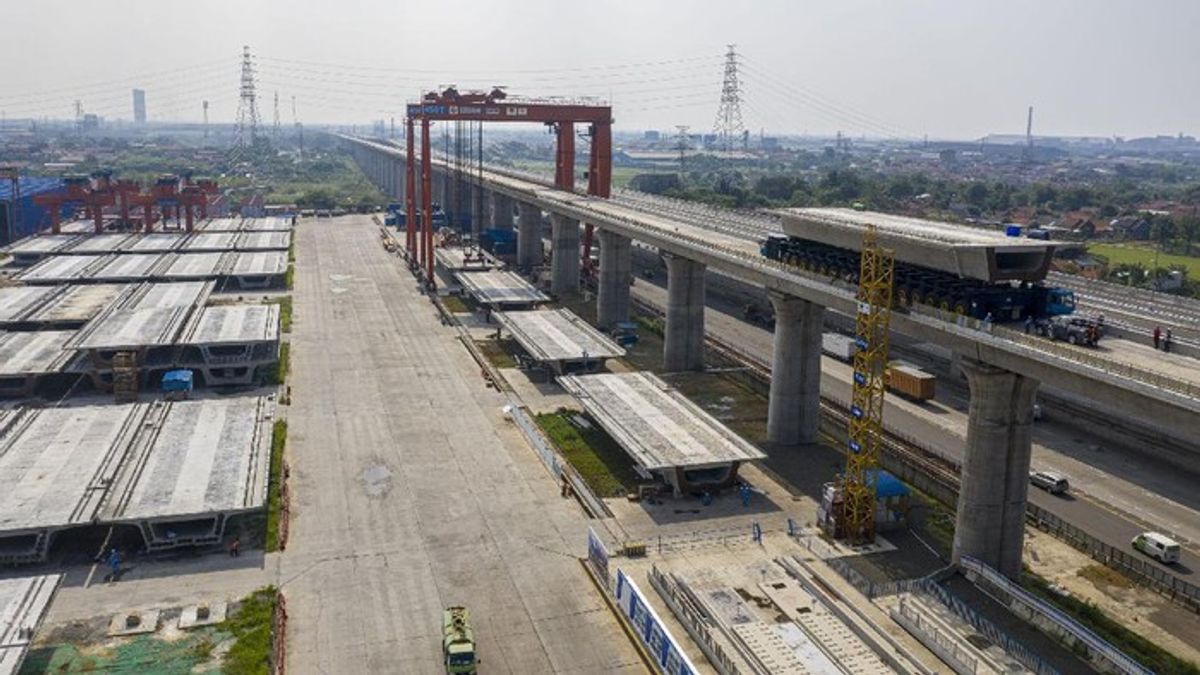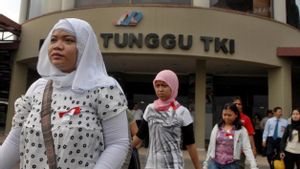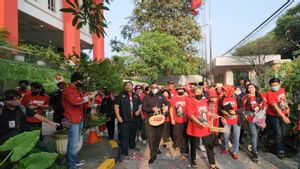JAKARTA - Philippines' new President Ferdinand Marcos Jr has canceled a $4.9 billion rail infrastructure project deal with China that was negotiated by his predecessor, Rodrigo Duterte.
This is because China has not kept its promise to provide funding for three projects: the Subic-Clark Railway Project managed by China Harbor Engineering Co. 3 Engineering Group Co. Ltd, and China Railway Engineering Consulting Group Co. Ltd.
The third project, Davao Digos of the Mindanao Railway, failed to proceed after China was unable to submit a short list of contractors for its design contract.

"The deal (with China) was withdrawn," said Philippine Ministry of Transport official Cesar Chavez.
Furthermore, the Philippines has not yet confirmed the future of the three railway projects. Will it renegotiate with China, find investors from other countries, or turn to private capital? Some also doubt whether China will provide a lower interest rate for the construction of the railway.
How about Indonesia?
The Jakarta-Bandung high-speed rail infrastructure development cooperation project also encountered many obstacles. Not even two years since 2020, the project has experienced a cost overrun from IDR 86.67 trillion to IDR 114.24 trillion.
Launching from tempo.co, the main causes are construction or EPC and land acquisition. Land acquisition for the fast track project is difficult because the route is very wide and passes through commercial areas.
Also, because of the cost of funding or financing costs. Project delays cause the financial burden in the form of interest during construction to swell. Head office and pre-operation costs were stretched.

“For example, land acquisition takes quite a lot of time to make the price of the acquired land also increase. Then, regarding geology, the COVID-19 pandemic, the use of GSM-R frequencies, and electrical installations," said GM Corporate Secretary of PT Kereta Cepat Indonesia China (KCIC), Rahadian Ratry in April 2022.
The China Development Bank (CBD) even asked the Indonesian government to share the cost overrun. In fact, in the initial agreement, China is willing to bear 75 percent of the financing. The budget will be disbursed by Chinese financial institutions. Meanwhile, the remaining 25 percent of the financing will be charged to a joint venture between China Railway Corporation and local partners in Indonesia.
PT Kereta Api Indonesia China (KCIC) is the owner of the Jakarta-Bandung high-speed rail project. A joint venture between a consortium of Indonesian State-Owned Enterprises (BUMN) through PT Pilar Sinergi BUMN Indonesia (PSBI) and a consortium of Chinese railway companies through Beijing Yawan HSR Co.Ltd, with the main business in the public transportation sector with a business to business (B2B) scheme.
Re-Audit
Member of the House of Representatives Commission VI from the Democratic Party, Herman Khaeron was furious and asked the government to conduct a thorough audit of the project, because there were indications of a change in the agreement in the middle of the road.
"It should have been from the start that the business-to-business scheme agreement had to be implemented, how come there was a sudden change in the middle of the road. Is it because of a miscalculation or because of overly optimistic planning, or what?" Herman said as quoted from bbc.com in October 2021.
Moreover, at this time, the government has agreed to use the APBN in financing the Jakarta-Bandung high-speed train through Presidential Decree No. 93/2021 which states that financing from the APBN is carried out with State Capital Participation to the consortium leaders and guarantees the obligations of the consortium leaders.
"Initially it was agreed that PTPN would prepare the land. Now they (China) don't want the system. China wants a consortium of Indonesian companies to deposit capital. The agreement scheme must be audited first, what kind of agreement and others. All uses of state finances have a mechanism," added Herman.

City planning observer, Nirwono Yoga also disagrees that the funding for the Jakarta-Bandung high-speed rail project should ultimately burden the state budget. After all, initially, President Jokowi had also said that the project would not use public money.
It is better to use funding from domestic and foreign private parties. The government must be able to convince investors of the certainty of support and convenience from government.
"Now it's absurd, the Jakarta-Bandung high-speed rail project is forced to continue. Seeing progress in the field, it is impossible to cancel it because it will become stagnant and will harm the country even more," he told VOI, Thursday (28/7).
However, the progress must be evaluated immediately, find solutions and accelerate completion, and prepare a management plan that brings future benefits to cover the losses that have been experienced at this time.
"If it can be completed in 2024, it would be better before changing the new government. If not, it may be stalled because the next government may not necessarily want to continue. This is something we have to watch out for together,” continued Nirwono Yoga.
In general, the effectiveness of the Jakarta-Bandung high-speed train is still in doubt. Because there are other alternatives. People can go through the Cipularang Toll Road, can take a plane to Husein Sastranegara Airport, or can take a regular train.
VOIR éGALEMENT:
"Indeed, the distance of the fast train can be fast, but how is the distance to the station. For example, residents of Jakarta who want to go to the station must first get stuck in traffic. But yes, fast trains may be more desirable if the price makes sense," he continued.
In China's initial feasibility study, the Jakarta-Bandung high-speed train is planned to pass through eight stations, with three of them located in Jakarta, namely Gambir in Central Jakarta, Manggarai in South Jakarta, and Halim in East Jakarta with a total rail length of 150 km.
However, according to the KCIC website, the Jakarta-Bandung high-speed train has a track length of 142.3 km that stretches from Jakarta to Bandung. Passing four stations stopping Halim, Karawang, Padalarang, Tegalluar with one depot located in Tegalluar. Each station will be integrated with mass transportation modes in each region.
The English, Chinese, Japanese, Arabic, and French versions are automatically generated by the AI. So there may still be inaccuracies in translating, please always see Indonesian as our main language. (system supported by DigitalSiber.id)













